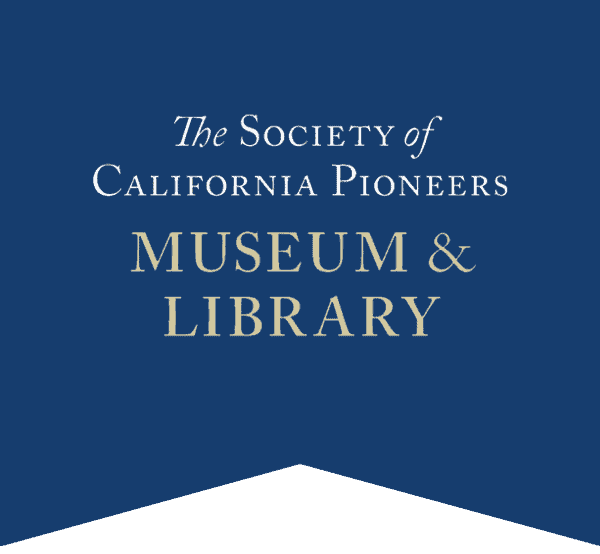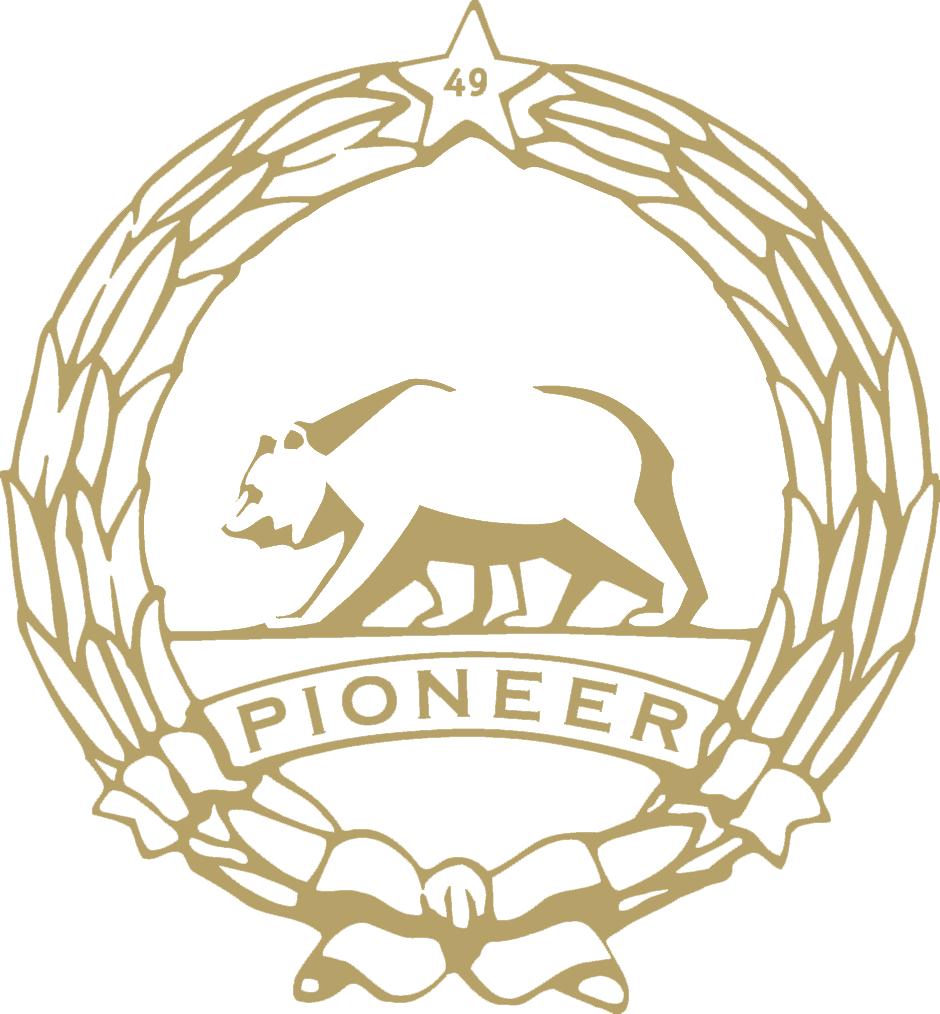Library & Special Collections
The Alice Phelan Sullivan Library was one of the first libraries established in the city of San Francisco.
The library collection is particularly rich in books and documents that chronicle the Spanish and Mexican eras, pioneer travels overland and around the Horn, the Gold Rush and later mining ventures, urbanization and the construction of the railroads, and biographical information on early Pioneers and other people in California history. By 1855, The Society had established an acquisition fund and began offering its reading room visitors the New York Herald, Punch, and a selection of popular novels while also acquiring materials pertaining to the early history of the state.
From a collection of 600 books in 1860, the library grew to house 3,000 volumes by 1878, including many seminal works relating to the state’s early history. Most of the books were lost in the earthquake and fire of 1906, but irreplaceable manuscripts like the Sutter diary and The Society’s institutional records that had been kept separately in a vault survived the disaster. After 1906, The Society rebuilt the collection so that it now numbers over 7,000 books and 20,000 manuscripts and archival items (maps, periodicals and other printed ephemera). There are also over 2,500 maps from the 19th and early 20th century in the collection.
A few major collectors have made significant contributions to the Library’s holdings. Some examples include the Charles B. Turrill collection of books, manuscripts, and photographs, the Sherman Music collection of sheet music, programs, and playbills, and manuscript collections such as the Jacob Rink Snyder papers, the Jacob Primer Leese Papers, the Cooper-Molera papers, and the Patterson Mining collection. All are important primary resources in the documentation of the state’s history. The collection is also notably strong in overland and ships’ diaries, many of them donated by Pioneer families. A few highlights of the collection are the New Helvetia diary of John Sutter describing the discovery of gold, the diary of Peter Decker that recounts his overland journey from Ohio and the early Yosemite valley, and the beautiful publication Voyage pittoresque autour du monde (Paris, 1822) with hand-colored lithographs by Louis Choris.

Interested in donating to our Collections?
We are always seeking to enhance our collection! All items offered for donation must fit within our collections guidelines and will be vetted and processed by our Collections Committee.
For further information, contact us at
[email protected].
Books & Manuscripts
The book collection spans from the 17th century through the present and includes published accounts of overland and ship journeys, city directories, biographies, state publications, periodicals and newspapers. Early explorations, railroad publications, 1906 earthquake and reference works round out the collection.
Manuscripts include diaries of early pioneers (written on both wagon trains and aboard ship), letters, ledgers, business records, and legal records. A sampling of the Californians represented in our collection includes: John A. Sutter, Thomas Starr King, Jacob R. Snyder, Jacob P. Leese, James H. Lick, John Charles Fremont, Charles Kimball as well as the Cooper-Molera Papers and the Patterson Mining Collection of mine records, correspondence and maps. Our scrapbooks also contain valuable manuscript material.
Our collection also includes the Autobiographies and Reminiscences of some of The Society’s earliest members. In 1900, our founding members were asked to write down their memories of arriving and settling in California. The Autobiographies and Reminiscences provide first-hand accounts of the migration west prior to 1850 and descriptions of life in California up until 1904. Some make mention of the places the settlers came from; all of them describe to some extent the journey out by overland or ship, sometimes via Missouri, a frequent point of departure, and often via Central and South America. They also include information on the industries in which the pioneers worked, among them agriculture, ranching, and mining, as well as observations about contemporary politics, social movements, and the leisure activities of the day.
These recollections were transcribed and bound into eight leather volumes – these rare, first-person accounts of life in early California are digitized and titled The Autobiographies and Reminiscences.

Maps & Ephemera
Our map collection numbers approximately 2,500 and includes maps from the 17th through the early 20th century. All are related to early exploration of the West and California, and many are hand-drawn or appear in manuscripts or diaries. Many of the maps are associated with the Patterson Mining Collection, which covers mining in California and Nevada in the second half of the 19th century and the early 20th century. All manner of maps are represented: hand-drawn, engraved, lithograph and chromolithograph.
Ephemera in the collection includes every printed material imaginable: billheads, business cards, playbills, menus and advertising. Other printed materials in the archives include sheet music, broadsides, and letter sheets. Our collection also includes Biographical, General California Files, and County files – which house a variety of resources such as newspaper clippings, brochures, and ephemera.

Association of Pioneer Women in California
On January 15, 2008, the Alice Phelan Sullivan Library received a call from Mr. Ivo Stipinovich informing us that his aunt, Lorna Claire Stipinovich, had passed away and that it was her wish that we receive the records of The Association of Pioneer Women of California (of which she had been its final president). The Library happily accepted the donation knowing that the Association was one of the earliest organizations of women descendants of Gold Rush pioneers. The collection is comprised not only of the cloth-bound membership ledger, but also Association bylaws, business receipts, minutes, and plans for the Log Cabin they designed and built in Golden Gate Park (where their meetings were held, and which still stands today).
The Association’s book contains over 800 accounts of their members’ journeys to California and their lives after arriving. It is also a trove of genealogical detail. The entire collection is a unique and significant addition to the state’s history of women Pioneers and The Society of California Pioneers is honored to make it available for researchers. Please click below to see the membership ledger for the Association of Pioneer Women in California.
A brief note on methodology: Our transcripts are an attempt to make the content of the book accessible to a wide audience regardless of geography or ability. The formatting standards we’ve adopted aim to balance fidelity to the handwritten text while also translating its content to improve access. Please email [email protected] to suggest revisions.
Lone Mountain/Laurel Hill Cemetery Records
Located between California Street and Geary Boulevard, between Parker and Presidio Avenues, Lone Mountain Cemetery was dedicated on May 30, 1854 and was renamed Laurel Hill Cemetery in 1867. The cemetery closed in the late 1930s and during the years 1939 and 1940 bodies were exhumed and moved to Cypress Lawn Cemetery in Colma, California, where they remain today.
The Society of California Pioneers is fortunate to have in its collection over twenty handwritten ledgers recording burials at Lone Mountain/Laurel Hill Cemetery. These ledgers contain a wealth of information, including the names of the dead, the date of their death, the cause of their death, their age at the time of death, where in the cemetery they were buried, as well as when or if their body was ever moved to another location.
Fascinating aspects of history are revealed in these rare and remarkable ledgers. An unprecedented spike in the number of burials during the days and weeks after April 18 confirms the scale of the 1906 Earthquake and Fire, while graphic descriptions entered as the causes of these deaths (such as “burnt to a crisp” and “crushed by falling bricks”) vividly recall the disaster’s horrific consequences. Often diseases, including Croup, Cholera, Carbolic Acid Poisoning, Alcoholism and even Beri Beri, are listed as causes of death, providing evidence of serious, ongoing health concerns in nineteenth-century San Francisco.
These ledgers were digitized thanks to a partnership with SF Genealogy that began in 2018. A San Francisco based nonprofit, SF Genealogy is a volunteer-run organization whose “primary purpose and highest priority is to provide free internet access to genealogical and historical information.” The City and County of San Francisco lost many vital public records in the 1906 Earthquake and Fire, making these cemetery records extremely valuable to genealogists and historians.



